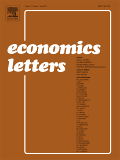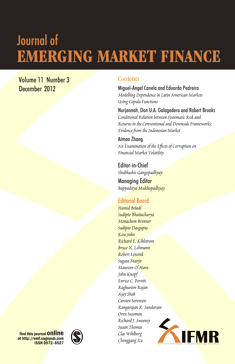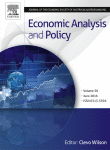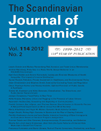
ECONOMICS LETTERS
Scope & Guideline
Elevating economic discourse with concise, impactful research.
Introduction
Aims and Scopes
- Empirical Analysis:
A significant portion of the journal's articles employs empirical methods to analyze economic phenomena, utilizing data from various sectors and regions to derive actionable insights. - Theoretical Contributions:
The journal also publishes papers that present novel theoretical frameworks or refine existing economic theories, often addressing contemporary issues such as market behavior, policy impacts, and economic dynamics. - Interdisciplinary Approaches:
Many articles integrate concepts from related fields such as finance, sociology, and environmental studies, highlighting the interconnected nature of economic research. - Policy Implications:
The journal emphasizes research that offers clear policy recommendations, making it a resource for policymakers and practitioners seeking evidence-based guidance. - Regional Focus:
While the journal covers global economic issues, there is a notable emphasis on emerging economies, particularly those in Asia, reflecting the growing importance of these regions in the global economic landscape.
Trending and Emerging
- Digital Economy:
Research on the digital economy, including topics such as fintech, digital currencies, and the impact of technology on economic practices, is rapidly gaining traction, reflecting the increasing importance of digital transformation in economics. - Environmental Economics:
There is a growing focus on environmental issues, particularly the intersection of economic policies and climate change, highlighting the need for sustainable economic practices and green finance. - Behavioral Economics:
Papers exploring the psychological factors influencing economic decisions are on the rise, indicating a shift towards understanding the human elements behind economic models. - Global Trade Dynamics:
Research addressing the impacts of geopolitical events, international trade agreements, and global supply chain disruptions is increasingly prevalent, underscoring the interconnectedness of global economies. - Health Economics:
The COVID-19 pandemic has catalyzed a surge in health economics research, with a focus on the economic implications of health policies, healthcare access, and the economic impact of health crises.
Declining or Waning
- Traditional Economic Models:
There has been a noticeable decrease in the publication of papers relying solely on classical economic models without incorporating contemporary data analytics or empirical validation. - Static Analysis:
Research focusing on static economic analyses, which do not account for dynamic changes or time-series data, is becoming less frequent, as the field shifts towards more dynamic and real-time analyses. - Limited Geographic Scope:
Papers that concentrate exclusively on developed economies are appearing less frequently, as there is a growing interest in issues specific to emerging markets and developing countries. - Descriptive Studies:
The journal is seeing fewer purely descriptive studies that lack rigorous methodological frameworks, as the demand for more analytical and evidence-based research increases. - Microeconomic Issues:
Topics centered solely on microeconomic issues, like consumer behavior without broader economic implications, are becoming less common as macroeconomic factors gain more attention.
Similar Journals

Journal of Emerging Market Finance
Exploring the Dynamics of Emerging MarketsThe Journal of Emerging Market Finance, published by SAGE Publications India Pvt Ltd, is a premier academic journal that serves as a vital resource for researchers, professionals, and students in the fields of finance and economics. Established in 2002, this journal focuses on the multifaceted dynamics of emerging market economies and their financial systems. With an ISSN of 0972-6527 and an E-ISSN of 0973-0710, it has garnered attention with its respectable Q3 rankings in both the Economics and Econometrics and Finance categories, reflecting its commitment to high-quality research. Despite its limited open-access options, the journal remains a significant platform for scholarly discussions, providing insights on emerging financial instruments, market behaviors, and economic policies in developing economies. As a continuously evolving publication, it aims to bridge the gap between theory and practice, promoting an understanding of the complexities faced in these vibrant markets, ultimately serving the academic community with relevant and impactful research until 2024 and beyond.

Series-Journal of the Spanish Economic Association
Advancing Knowledge in Economics, Econometrics, and FinanceSeries-Journal of the Spanish Economic Association, published by SPRINGER HEIDELBERG, stands at the forefront of economic research, specifically focusing on the diverse and evolving landscape of economics, econometrics, and finance. Since its transition to Open Access in 2010, the journal has provided a platform for innovative research and thought leadership, fostering accessibility and collaboration within the academic community. With an impressive impact reflected in its Q1 classification in the Economics, Econometrics and Finance category, the journal has gained recognition for its commitment to high-quality, rigorous scholarship, as evidenced by its Scopus rank of #98 out of 288, placing it in the 66th percentile. Its purview encompasses a broad range of topics, making it an essential resource for researchers, professionals, and students looking to keep abreast of the latest developments and trends in economics. With its dedication to advancing knowledge from 2010 to 2024, the journal remains a pivotal contributor to the global economic discourse, seeking to bridge empirical research with practical applications.

Empirical Economics
Connecting data-driven findings with real-world applications.Empirical Economics, published by PHYSICA-VERLAG GMBH & CO in Germany, is an esteemed journal in the field of economics that has been disseminating high-quality research since its inception in 1976. With an impressive convergence of studies that extends to 2024, the journal occupies notable positions within various academic categories, achieving a Q2 ranking in Economics and Econometrics and Statistics and Probability, and a commendable Q1 ranking in Mathematics (miscellaneous) and Social Sciences (miscellaneous) as of 2023. The journal stands out for its interdisciplinary approach, evidenced by its Scopus ranks that place it in the top percentiles across multiple sections, including the 86th percentile in both Mathematics and Social Sciences rankings. While currently not an open access journal, Empirical Economics serves as a pivotal platform for researchers, professionals, and academics seeking to engage with empirical methodologies that drive contemporary economic analysis and policy formulation. Its commitment to disseminating significant findings in the rapidly evolving landscape of empirical economic research makes it a must-read for anyone interested in the interplay between data and economic theory.

ATLANTIC ECONOMIC JOURNAL
Advancing Economic Thought and PracticeWelcome to the Atlantic Economic Journal, an esteemed publication in the field of economics, econometrics, and finance, published by Springer. With its inception dating back to 1973 and a significant publication history extending to 2024, this journal has continuously contributed to the discourse on economic theory, policy, and practice. The journal holds a Q3 rank in the latest category quartiles of 2023, showcasing its relevance within the competitive landscape of economic research. Though it does not offer open access options, readers and contributors can expect rigorous peer-reviewed articles that enhance their understanding of economic phenomena and analytical methods. The journal is indexed in Scopus, where it ranks #154 out of 288 in the general economics category, placing it in the 46th percentile. The Atlantic Economic Journal is not just a resource but a platform facilitating the engagement of researchers, professionals, and students in critical economic discussions, furthering knowledge and innovation in the field.

Eurasian Economic Review
Exploring the dynamics of Eurasian economies.Eurasian Economic Review is a premier academic journal dedicated to the dissemination of high-quality research in the field of economics, notably within the Eurasian context. Published by SPRINGER HEIDELBERG in Switzerland, this journal stands out with an impressive Q2 ranking in the 2023 category of Economics, Econometrics and Finance, reflecting its influential role in fostering scholarly dialogue. The journal encompasses a broad array of topics related to economic trends, policy impacts, and theoretical advancements, making it an essential resource for researchers, professionals, and students alike. With a consistent output since its inception in 2011, the Eurasian Economic Review is committed to providing open access to its valuable content, ensuring that important findings are widely available to the global research community. As a member of the top 9th percentile in Scopus rankings for its field, this journal uniquely positions itself as a vital conduit for innovative and impactful research in economics.

Economic Analysis and Policy
Connecting Theory and Policy for a Sustainable FutureEconomic Analysis and Policy is an esteemed academic journal published by ELSEVIER, dedicated to advancing the field of economics and econometrics since its inception in 1970. Based in the Netherlands, this journal plays a pivotal role in disseminating high-quality research that addresses contemporary economic issues and policy challenges. With an impressive Q1 ranking in both the Economics and Econometrics categories, and recognition in the top 91st percentile of Scopus rankings, it is a leading platform for scholars, professionals, and students seeking to contribute to and engage with the evolution of economic thought. The journal does not currently operate on an open access model, allowing it to maintain rigorous peer-review standards that ensure the integrity and impact of published research. As a vital resource for anyone interested in the intersection of theory and policy in economics, Economic Analysis and Policy fosters a community committed to rigorous analysis and innovative solutions in the economic domain.

SCANDINAVIAN JOURNAL OF ECONOMICS
Advancing Economic Thought and PracticeSCANDINAVIAN JOURNAL OF ECONOMICS (ISSN: 0347-0520, E-ISSN: 1467-9442), published by Wiley, stands as a pivotal platform for disseminating research in the fields of economics and econometrics. With an impressive Q1 ranking in both disciplines, this journal plays a critical role in advancing theoretical and applied economic research, catering to an international audience of scholars, practitioners, and students. Its coverage from 1977 to 2024 demonstrates a robust commitment to publishing high-quality research that influences both policy-making and academic inquiry. Although it operates on a traditional subscription model, the journal remains accessible to a broad readership, which is essential for fostering knowledge sharing within the economics community. As such, the SCANDINAVIAN JOURNAL OF ECONOMICS is an essential resource for those seeking to explore the latest developments and methodologies in economic research, helping to bridge practical insights with academic rigor.

Quantitative Finance and Economics
Transforming Financial Decision-Making Through Rigorous StudiesQuantitative Finance and Economics, published by the American Institute of Mathematical Sciences (AIMS), is a pioneering open-access journal committed to advancing the fields of finance and economics. Established to disseminate high-quality research, this journal has been an open-access platform since 2017, promoting wider accessibility to vital academic findings. It serves as a crucial resource for researchers and professionals alike, offering valuable insights through rigorous studies in quantitative methods that influence financial and economic decision-making. Although current Scopus rankings indicate emerging challenges, with a rank in the lower percentiles across various categories, Quantitative Finance and Economics strives to gain recognition by bridging theoretical frameworks with practical applications. The journal invites contributions that explore innovative quantitative techniques and their implications in contemporary economic scenarios, thus underscoring its role in shaping discourse and research in this critical sector.

Panoeconomicus
Innovating Research in the Heart of SerbiaPanoeconomicus is a renowned academic journal published by SAVEZ EKONOMISTA VOJVODINE, specializing in the evolving fields of Economics, Econometrics, and Finance. Since its inception as an Open Access publication in 2006, this journal has fostered a collaborative environment for scholars and practitioners to disseminate research that contributes to critical economic discourses. Based in Serbia, and operating within an international context, Panoeconomicus carries an impressive Scopus Rank in the 57th percentile, further reflected in its Q3 category quartile for Economics, Econometrics, and Finance as of 2023. With a commitment to enhancing academic dialogue through readily accessible content, the journal is instrumental in shaping new insights and methodologies available to researchers, finance professionals, and students alike. Its significance in the field continues to grow, particularly as it addresses pressing economic challenges from 2009 to 2024 and beyond, making it a valuable resource for those aiming to stay at the forefront of economic research.

Journal of Economics Finance and Administrative Science
Connecting academia to real-world economic challenges.Journal of Economics Finance and Administrative Science, published by Emerald Group Publishing Ltd, is a premier open-access journal that has been at the forefront of advancing knowledge since its inception in 2012. With an ISSN of 2077-1886 and E-ISSN of 2218-0648, the journal caters to the disciplines of economics, finance, and administrative sciences within an international context, specifically observing trends from Peru and beyond. This highly regarded journal holds a Q1 ranking in Economics, Econometrics and Finance for 2023, landing it in the top percentile among its peers, with an impressive Scopus rank of #33 out of 288 in general economics. Since transitioning to open access in 2017, the journal has democratized access to cutting-edge research, making it indispensable for researchers, professionals, and students alike. By publishing rigorous empirical studies, comprehensive reviews, and innovative theoretical contributions, the Journal of Economics Finance and Administrative Science aims to facilitate knowledge exchange and foster collaboration within the global academic community.